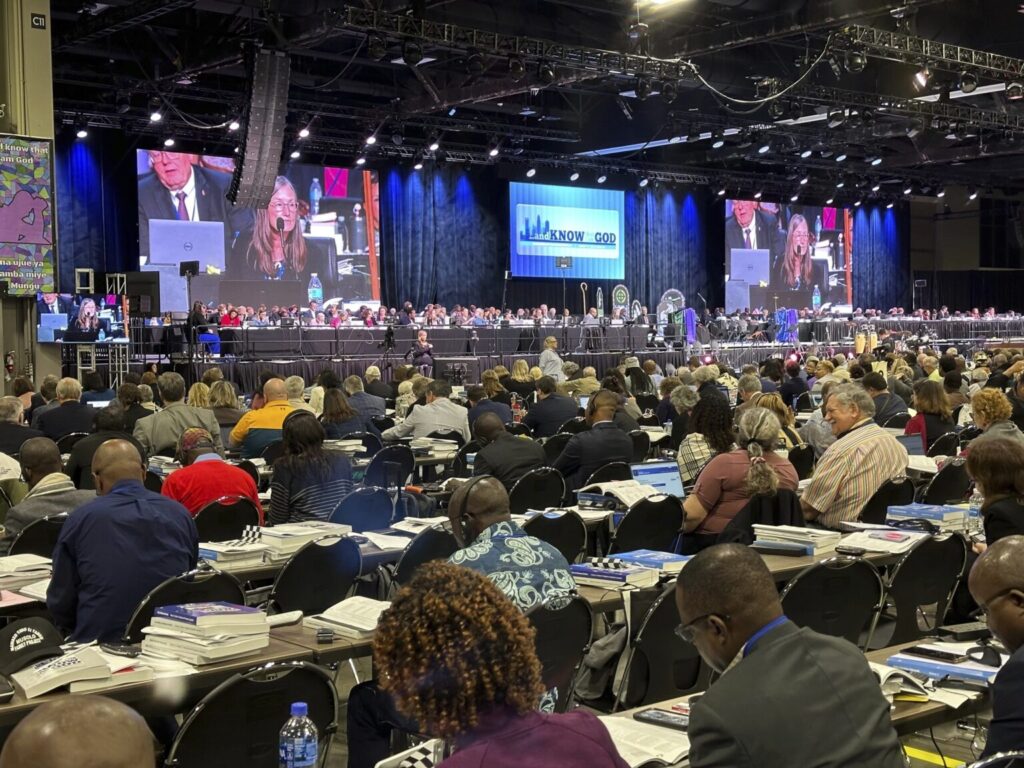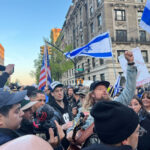Among the rules overturned were a ban on bishops ordaining LGBTQ candidates for ministry, a ban on funding for LGBTQ affinity groups as well as a series of mandatory penalties for clergy who officiate same-sex weddings.

CHARLOTTE, N.C. (RNS) — United Methodists meeting at their quadrennial General Conference began shedding some of the contentious rules restricting gays and lesbians that have torn apart the global denomination in recent years.
In an orderly morning meeting Tuesday (April 30), a series of rules were dissolved as part of a packet of 106 agenda items with no debate on the floor of the Charlotte Convention Center.
They were part of long-awaited motions that over the course of the conference, which concludes on Friday, may result in the nation’s second largest Protestant group officially dropping some, or all, of its LGBTQ restrictions.
Those restrictions have been at the forefront of a schism in the United Methodist Church that has led to the departure of some 7,600 traditionalist churches across the United States from 2019-2023— about 25% of the total number of U.S. churches.
Among the items that fell away Tuesday were a ban on bishops ordaining LGBTQ candidates for ministry, and a series of mandatory minimum penalties for clergy who officiate same-sex weddings. Both items were adopted by the General Conference in 2019 under the so-called Traditional Plan that solidified restrictive policies on homosexuality. Another ban, on funding for LGBTQ affinity groups or ministries, is much older. It too was eliminated.
Delegates passed the three items, part of a much larger package of petitions, 667-54 with no debate.
More bans may be eliminated on Wednesday, including an older ban on ordaining gay clergy as well as the deletion of a passage from the rule book, the Book of Discipline, which views homosexuality as “incompatible with Christian teaching.”
“Today, I feel like for the first time in 43 years of ministry in the United Methodist Church where the church is not out to get me,” said the Rev. David Meredith, a gay Cincinnati pastor and chairman of the board of the Reconciling Ministries Network ,an advocacy group for LGBTQ people.
Many delegates to the General Conference also felt confident for the first time in decades that they may have the votes to rid the denomination of all or most of restrictive LGBTQ language in the church books.
We know we have a simple majority to overturn the rest,” said the Rev. Andy Oliver, pastor of Allendale United Methodist Church in St. Petersburg, Florida. Oliver is a straight man but has officiated at numerous same-sex weddings and has been charged with disobedience, a charge that will likely be dropped with passage of a motion freezing all judicial proceedings concerning human sexuality.
Bishop Sally Dyck, the ecumenical officer of the Council of Bishops, said the votes Tuesday signaled “a new day in General Conference.”
“We trust that we’ll be able to bring forward social principles on all kinds of things, including human sexuality, that will cause the church to be much more generous and gracious towards all people within the church and outside of the church,” Dyck said in a press conference.
Despite the restrictions, a growing group of gay clergy have been ordained over the past decade, including two openly gay bishops. These LGBTQ ministers were able to overcome church law because some local church leaders have been willing to advance their ordination in defiance of church rules. Decisions on ordination are left to local church conferences.
According to the Reconciling Ministries Network, there are 324 gay UMC clergy in the U.S., including candidates for ordination. Of those, about 160 are in same-sex marriages.
But there have been consequences for those willing to resist church rules. The denomination has charged many members with disobedience and put them before church trials for violating the ban.
“We’re hoping that what will happen this week is that the precarious situation will disappear,” said Helen Ryde, a member of the steering committee of the first-ever United Methodist Queer Delegate Caucus, before Tuesday’s vote. Ryde is also an organizer for the Reconciling Ministries Network.
The General Conference is the denomination’s first legislative gathering since 2019. Nearly 800 delegates are representing the denomination’s estimated 11.5 million worldwide members.



